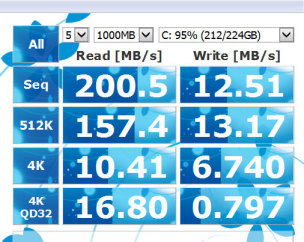Please come back later for added links, photos, etc! (posting from work)
System Use: Web-oriented graphics design and programming, Video editing (not a lot yet, but I have plans), Video Converting and Encoding, Gaming (can play Retrovirus finally!), the odd BlueRay. Secondarily I have had an eye toward possibly setting up a few Zero-Client Virtual Desktops around the house and using this machine to power those. Lastly, and ever in the back of my mind, is the goal of rising up to peer out at the cutting edge (consumer cutting edge) of modern computing--I'm tired of hearing people (family members) who buy cheap-sh** hardware complain about how software is getting too bloated (partly true), and computers "used to be fast." I know companies cut all kinds of corners, and create all kinds of bottlenecks to bring that price down to entice the ignorant masses, and IMO for the amount of time spent waiting on it and being annoyed by it it's just not worth saving that money.
Budget: ~$1500.00
Specs (purchased)
Case: Fractal Design Arc XL (bought on sale for cheaper than the mid-size)
Power Supply: Corsair CX600 (bought on sale, but regret not stepping up to the next line for +$20)
CPU: Intel Core i7-4770K Quad-Core
Motherboard: Asus Z87-Pro
CPU Cooler: Corsair H110 (Dual 140mm fan) Closed Water Cooler (bought on sale)
RAM: 2x8GB G.Skill Trident X Series DDR3 2400MHz Cas 10
Main Drive(s): Dual Seagate 600 240GB SSDs in Raid 0 (bought on sale)
Additional Storage: Seagate Barracuda 2TB 7200rpm HDD
Optical Drive: LG 14X Blu-Ray Burner w/M-Disk support
Operating System: Windows 7 Ultimate (from a friend)
Keyboard: Corsair Vengeance K70 Cherry MX Brown
Upgrade (down the road)
Graphics: EVGA GeForce GTX 760 or 770 2GB
Display (or 2): High-quality AH or P IPS 23"-27" display
Mouse: Gaming-grade laser mouse
PCI-e: PCoIP Driver Card (EVGA), Discrete Sound Card
Like I said, this is for fun, so feel free to throw in your critiques, experiences, approval, warnings (Krom?







